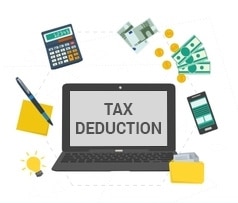Individual Expenses: A guide to what is tax deductible
It’s tax time!

So, what is tax deductible ?
As tax time isn’t too far away I thought I’d do a quick google search to uncover some of the more outrageous attempts to claim what can only be described as an “exotic” mix of expenses.
Only in the USA!
According to Forbes magazine, some of the successful claims that have escaped the IRS include breast augmentation, a lover being paid to find furniture, oversee repairs at rental properties and to run the household, pet food, drink driving expenses, babysitting fees, free beer given as promotion, pet moving expenses, body oil and even swimming pool expenses after a taxpayer was advised by his doctor to exercise!
Those that haven’t passed muster include parents putting their child in clarinet lessons, arguing that it would correct the child’s overbite. An individual hired an arsonist to burn down his house, collecting a $500,000 insurance policy along the way and then attempted to claim the $10,000 that he paid the arsonist, describing it as a “consulting expense”. One woman even tried to write off the cost of her “Zumba” classes!
Now for the serious stuff!
At the outset, we strongly advise that, if your financial structures are complex and involve a number of entities (individuals, trusts, trustee companies etc) then please, please PLEASE consult an accountant! If you have a rental property then I’m sure you will know you’ll have needed to keep records right from the start to enable you to work out what expenses you can claim as tax deductions, and declare all your rental-related income in your tax return.*
If your records are in a mess, however, then all is not lost – needless to say, a little bit of early preparation now will make the process so much less stressful when we come to the new financial year.
For individuals, a quick review of the expense groups generally allowed by the ATO highlights the following:

Vehicle and travel expenses
You can claim vehicle and other travel expenses directly connected with your work, but generally, you can’t claim for normal trips between home and work – this is considered private travel. You need to keep records of your travel expenses.
Clothing, laundry and dry-cleaning expenses
You can claim a deduction for the cost of buying and cleaning occupation-specific clothing, protective clothing and unique, distinctive uniforms. To make a tax deduction you may need to have written evidence that you purchased the clothing and diary records or written evidence of your cleaning costs. If you received an allowance from your employer for clothing, uniforms, laundry or dry-cleaning, make sure you show the amount of the allowance on your tax return.
Gifts and donations
You can only claim a tax deduction for gifts or donations to organisations that have the status of deductible gift recipients (DGRs). Deductions for gifts are claimed by the person that makes the gift (the donor). For you to claim a tax deduction for a gift, it must meet four conditions:
- The gift must be made to a deductible gift recipient. We call entities that are entitled to receive tax deductible gifts ‘deductible gift recipients’ (DGRs).
- The gift must truly be a gift. A gift is a voluntary transfer of money or property where you receive no material benefit or advantage.
- The gift must be money or property, which includes financial assets such as shares.
- The gift must comply with any relevant gift conditions. For some DGRs, the income tax law adds extra conditions affecting the types of deductible gifts they can receive.

Home office expenses
You may be entitled to claim deductions for home expenses including a computer, phone or other electronic devices you are required to use for work purposes, as well as a deduction for running costs.
As an employee, generally, you can’t claim a deduction for occupancy expenses, including rent, mortgage interest, council rates and house insurance premiums.
Claiming a computer, phone or other electronic devices as a work-related expense
If you are an employee and required to use your computer, phone or other electronic devices for work purposes, you may be able to claim a deduction for your costs.
Interest, dividend and other investment income deductions
You can claim a deduction for expenses incurred in earning interest, dividend or other investment income. You cannot claim a deduction for receiving an exempt dividend or other exempt income.
Self-education expenses
You may be able to claim a deduction for self-education expenses if your study is work-related or if you receive a taxable bonded scholarship. In some circumstances, you have to reduce the amount of your claim by $250.

Tools, equipment and other assets
If you buy tools, equipment or other assets to help earn your income, you can claim a deduction for some or all of the cost.
If the tools are used for both work and private purposes you will need to apportion the amount you claim. If you have a computer that is used for private purposes for half of the time you can only deduct 50% of the cost.
The type of deduction you claim depends on the cost of the asset:
- For items that don’t form part of a set and cost $300 or less, or form part of a set that together cost $300 or less, you can claim an immediate deduction for their cost.
- For items that cost more than $300, or that form part of a set that together cost more than $300, you can claim a deduction for their decline in value
Examples of tools, equipment or assets:
- calculators
- computers and software
- desks, chairs and lamps
- filing cabinets and bookshelves
- hand tools or power tools
- protective items, such as hard hats, safety glasses, sunscreens and sunglasses
- professional libraries
- safety equipment
- technical instruments.
You can also claim the cost of repairing and insuring your tools and equipment and any interest on money you borrowed to purchase these items.
If you use items for both personal and work-related purposes you need to keep records, such as a diary, so that, if requested, you can show how you apportioned the amount of private use and work-related use.
Other deductions

As a rule of thumb, if you need to spend money to earn income, you can usually claim it – either as an immediate deduction or over time.To be a legitimate expense claim, you have to be able to show that you need to incur the expense to earn the income, and the expense is not private or domestic in nature.
*Property investors note
Note that any capital gain you make when selling or otherwise disposing of the property will be subject to capital gains tax (CGT) except in some circumstances where you rent out the home you’ve been living in. If you have an investment property that is not rented or available for rent – such as a holiday home, hobby farm, or another dwelling you choose not to rent:
- the property is subject to CGT in the same way as a rental property
- you generally can’t claim income tax deductions for the costs of owning the property because it doesn’t generate rental income
- you may be able to include your costs of ownership in the property’s cost base, which would reduce any capital gains tax liability when you sell it.
About Intuitive Finance
The team at Intuitive Finance will listen to your needs, undertake a comprehensive review of your current financial position and then provide a clear, detailed and comprehensive investment strategy for you to put in place. We have written close to a billion dollars in loans and our team has access to over 500 financial products from more than 30 lenders covering a myriad of requirements – from home loans for repeat and first home buyers to first time and astute investors – and is perfectly placed to help guide you through the available options.
Disclaimer:
The financial industry is a dynamic industry – continually evolving and changing. Whilst every effort has been made to ensure its accuracy, no guarantee is given that the information contained herein is currently correct. To the extent permitted by law, Intuitive Finance accepts no responsibility or liability for any loss or damage what so ever (including direct and indirect) to any person arising from the use or reliance on the information detailed here.
- When should you refinance? Navigating RBA rate cuts and loyalty rates - January 23, 2026
- What the latest inflation data means for borrowers with the upcoming February RBA decision - January 20, 2026
- Common mortgage mistakes first‑home buyers still make in 2026 - January 5, 2026
